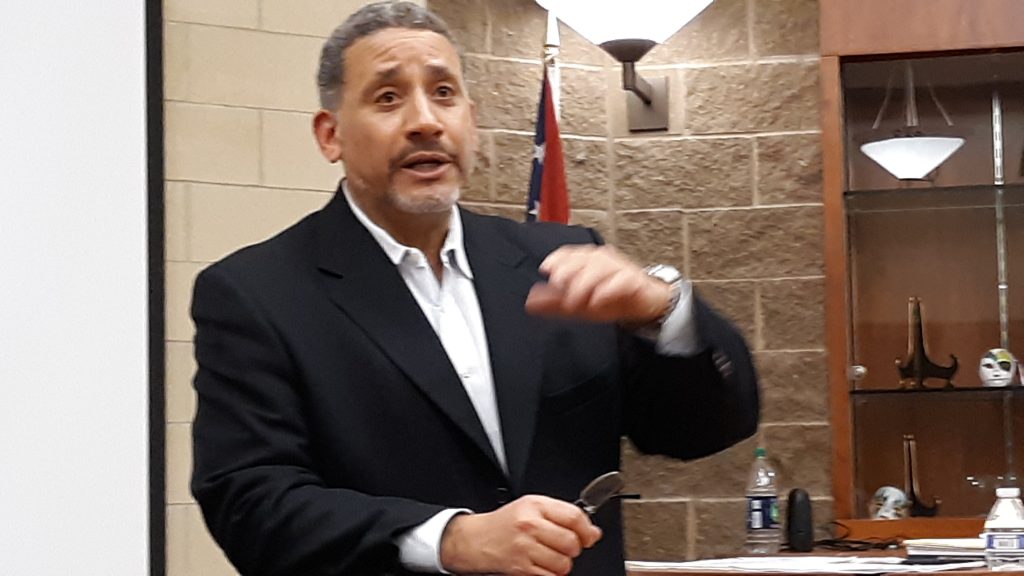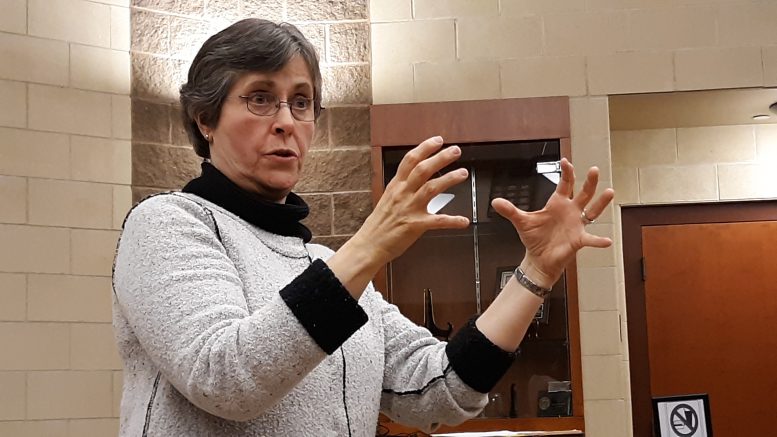By JAN LARSON McLAUGHLIN
BG Independent News
Nobody said it would be easy. But few expected it to be this hard to come up with a way to finance new or renovated buildings for Bowling Green City Schools.
For at the same time as finding a solution for paying for buildings, the finance task force is dealing with the reality that the district has so many other tax issues looming in the near horizon.
“You have a lot to figure out,” said David Conley, of Rockmill Financial, who is overseeing the school finance task force.
“I have never dealt with a structure this complicated,” Conley told the task force members Tuesday evening.
“No matter how you slice it, it’s going to be a lot,” he said of the potential of five school tax issues on the ballot in the next three to five years.
To try to simplify the options available, Becky Princehorn, a leading attorney in Ohio for school levy and bond issues, spoke with the task force Tuesday evening.
Princehorn herself conceded that the options are far from simple. Adding to the complexities are:
- Tax rollbacks, which were ended by the state, but which can be continued by the school district if it passes renewal – not replacement levies.
- The uncertainty of state OFCC funding – which is completely depleted now.
- The fact that income taxes must be either on traditional or earned incomes – not both.
- The conclusion that bonds from property taxes are the most secure, so they end up being the least expensive in the long run – but these also hit landowners and the agricultural communities the hardest.
- Voter fatigue – which has the district looking at combining some tax issues so it doesn’t have to keep coming back to voters.
Further complicating the task force’s job are claims by a couple members that the school district’s budget contains a great deal of waste, and that the district should look at dropping non-mandated programs at the schools.
Conley and Princehorn tried to keep the discussion on track. In the simplest terms, the district has three options for raising funds – property tax, income tax or a combination of the two.

Of importance to the task force, Conley said, is keeping the terms of any bond issue as short as possible.
While Princehorn understood that concern, she also noted that “flexibility” is the key word. Some school districts get themselves into trouble if they try to cut corners too close.
“Then if you can pay it off sooner, that’s great,” she said.
She talked about districts that had to ask for more millage when too many homes went into foreclosure.
“I did a lot of work up this way during the great recession,” she said.
Distrust by voters often leads them to want too tight of a rein on district spending – which leads to hamstringing the district and often adds up to more expenses. She referred to voters who make statements like, “my kids didn’t have terrazzo floors.” They don’t realize that investing in better material now will save the district in the future, she said.
Princehorn worked with both Eastwood and Northwood as they financed their new schools. Northwood used both a property tax bond issue and income tax. Eastwood had a windfall from the Home Depot distribution center which helped fund its local share of building costs. Both districts were helped by the state’s OFCC program.
Currently, Bowling Green is ranked at 518 for OFCC funding – and that’s if there is any money available in the future. The district is stuck in the position of “folks who are too poor to be rich, and too rich to be poor,” Princehorn said.
“You don’t know when you’re going to come up and have your name called,” she said.
But the more pressing issue presently is that the OFCC program is “seriously out of money,” she said.
“It’s a horrific situation,” with some districts passing bond issues, but now the state has no funding for its share. There have been state discussions about just ending the OFCC program, Princehorn said.
The Bowling Green task force had considered the Expedited Local Partnership Program from the OFCC as a possible funding option. But Princehorn cautioned, “ELPP is kind of like a field of dreams.”
But there is no harm in getting situated for state funding if it ever becomes available. And even though Bowling Green’s state share is far lower than some – at 17 percent – that’s far higher than nothing.
“Even the higher wealth districts want to try to leverage state money,” Princehorn said.
Princehorn also warned that some school districts find the strings that come with state money to be too confining. She talked about Maumee, which decided to use all local funding rather than build to state standards.
“The real tension point is – is it going to cost you more to use their design manual than it’s worth to you,” she said.
Regardless of whether Bowling Green gets state funding, the question must be resolved about what type of local funding to use. Income tax has been noted as preferred by some task force members since it doesn’t put the burden on landowners.
Princehorn reminded them that the district can only have a traditional or earned income tax in place. The district currently has a traditional income tax – but may want to consider switching over to an earned income tax – which has a smaller tax base and would automatically bump up the 0.5 percent tax to 0.75 percent.
Bonds backed by income tax have shorter term limits and can be used – but “your number has to have been called to use that” with state funding, she said.
Princehorn stated her preference for property taxes, which are more secure and acquire better interest rates. Ultimately, the property tax bonds will cost the taxpayers less, but she added, “it is not the only way.”
Bowling Green should probably work to preserve its state rollbacks – which require the state to continue paying 12.5 percent of property taxes, she said. Those rollbacks changed in 2013, when the state stopped paying and stuck the entire 100 percent with local taxpayers.
School districts can secure those rollbacks by passing renewals of levies put in place prior to 2013. They can also add increases to the levies, but only the renewal portion will get the rollback, she said.
“Preservation of state rollbacks is driving all levy planning right now,” she said.
Princehorn said the district needs to decide the best option of mixing and matching levies, and decide what type of tax funding for buildings works for Bowling Green.
“What’s the best overall configuration for this community at this time,” she said.
Voter fatigue is a serious concern for a district facing so many tax issues in such a brief period. “That’s challenging even for some of the most ardent members of the community,” she said.
Realizing the challenges ahead, the school board is considering dropping the high school from the renovation list for now, and only focusing on the elementaries.
“I think the board was being practical,” in possibly limiting the building projects, Conley said.
Task force member Richard Strow voiced frustration over all the untapped income at BGSU, which is exempt from property taxes.
“Why do they get a pass on real estate tax in our district,” Strow said.
“They’re the king,” Princehorn replied.
Questions were also asked about a countywide sales tax or a municipal income tax for schools – but in most cases the intricacies make them difficult or nearly impossible to implement.
The finance task force’s next meeting will focus on the school district’s five-year forecast, and the potential for five tax ballot issues in the next three to five years.
Task force member Grant Chamberlain suggested that the budget be reviewed line by line.
“I can show you a five-year forecast with a lot of waste in it,” he said.
Conley said the task force will not do that.
“There’s no way on this planet we’re going through every line item,” Conley said.
Chamberlain said there is waste in the budget that can be used for buildings.
“There isn’t,” Conley said.
Chamberlain said he is an expert in finance.
“I doubt that you are. You think that you are,” Conley responded.
Task force member Richard Chamberlain said the district needs to identify non-mandated programs that could be cut to save money.
Non-mandated programs include such items as athletics, agriculture education, art, band, choir, DECA, drama, and more.
Again, Conley said no.
“If you guys want that at the next meeting, it’s not going to happen,” he said.
The next meeting on the five-year forecast will be Feb. 7, at 7 p.m. The meeting after that will be Feb. 13, at 7 p.m., with a focus on who would pay which taxes, and who is exempt. Conley emailed vast spreadsheets to task force members identifying the landowners of all the property in the school district.

